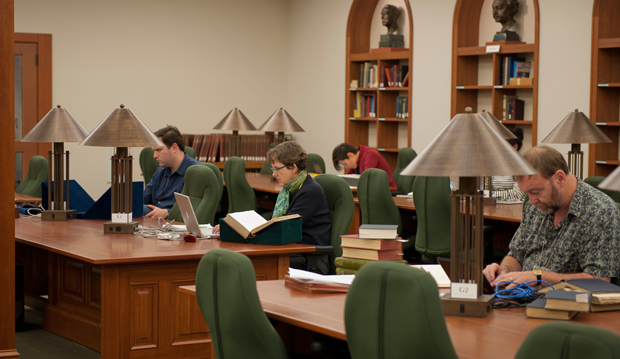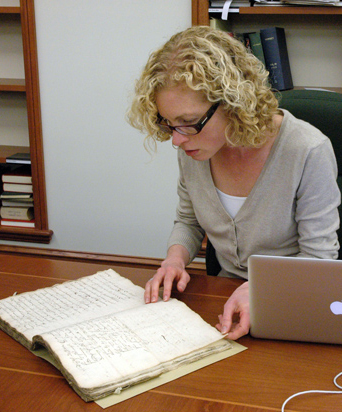Posted on Fri., June 22, 2012 by
When the halls of academe begin to empty for the summer, the corridors of The Huntington start filling up. University and college faculty members make up a large percentage of the Library's researchers, and when school lets out in June they put away their syllabi and turn to their own research. While their students hit the beaches or go backpacking across Europe, these scholars are traveling through the pages of history and literature to destinations as remote as Medieval England or as rugged as the American frontier.
This surge of scholarship makes summertime the busiest season of the year for the Library's Reader Services staff, a nine-member team whose job is to provide assistance to visiting researchers.
"We're part reference assistant, part concierge," says Kadin Henningsen, the department's information coordinator. "In addition to registering and providing orientations to new readers, we assist them with a slew of questions, ranging from how to find a specific manuscript in the catalog to where to get the best dim sum. It's never a dull day."
The top priority, of course, is getting the Library's resources into the researchers' hands as quickly as possible, since their time is limited and every minute counts. The staff works diligently to deliver materials to these scholars in a timely way.
Some quick summer facts, at a glance:
- An average of 103 readers sign in each day between June and August.
- Five new readers and seven renewals are processed every day.
- Some 80 rare books, 1,900 manuscripts, and 1,100 historical photographs are viewed by readers daily in summer. That's nearly four times the circulation seen in December.
- The areas of the collections most heavily used are British literature, American history, and the history of California and the West.
- Desk space is available for 94 researchers studying rare materials in the Ahmanson Reading Room. An additional 40 workspaces are assigned to scholars working with the reference collections in the Rothenberg Reading Room.
As dozens of laptop computers begin to hum in rooms redolent of parchment, faded ink, and aged leather bindings, the atmosphere of the Library becomes energized. Researchers meet new colleagues who share related fields of interest. A historian studying California immigration during the Gold Rush might enjoy a lunch-hour roundtable with a researcher of women's contributions to the development of the west and a scholar documenting the environmental impact of western expansion. Debates are lively as ideas are exchanged and new insights are gained.
Alison Bigelow is a postdoctoral fellow at the Omohundro Institute of Early American History & Culture, in Williamsburg, Va. In a partnership with The Huntington, Omohundro Fellows conclude their two-year fellowships with a two-month stint at The Huntington. She has kept busy speaking with manuscript curators about her topic, "Mining Empire, Planting Empire: The Colonial Scientific Literatures of the Americas." "The entire staff has worked to create a space where scholars in different fields can share in a rich intellectual community. I'm so thankful for the opportunity to be here."
Not a bad way to spend a summer vacation, is it?
Lisa Blackburn is communications coordinator at The Huntington.

